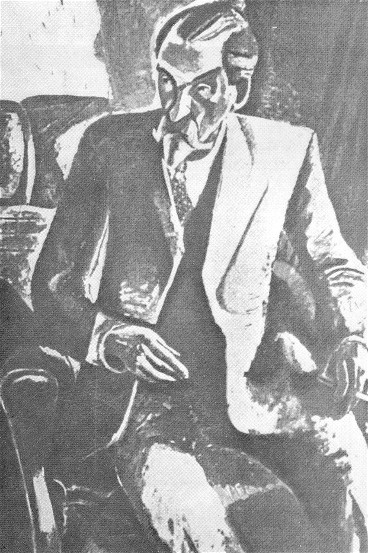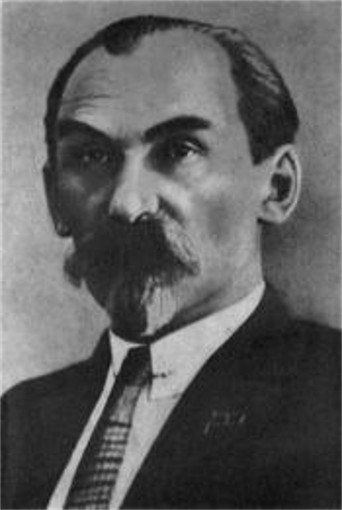Skrypnyk, Mykola
Skrypnyk, Mykola, b 25 January 1872 in Yasynuvata, Bakhmut county, Katerynoslav gubernia, d 7 July 1933 in Kharkiv. Bolshevik leader and Soviet Ukrainian statesman; full member of the All-Ukrainian Academy of Sciences from 1929. After his first arrest in 1901, Skrypnyk abandoned his studies at the Saint Petersburg Technological Institute and became a full-time Marxist revolutionary in Saint Petersburg, Odesa, Katerynoslav, Riga, and Moscow. By 1917 he had been arrested 15 times and exiled 7 times to places such as Yakutiia (1909–13) and Tambov gubernia (1914–17). During the Bolshevik coup in Petrograd in November 1917, he was a member of the supreme command of the military-revolutionary committee. In December 1917 he was elected in absentia to the People's Secretariat, the first Soviet government in Ukraine, and in March 1918 he was appointed its chairman by Vladimir Lenin. At the Tahanrih Bolshevik Conference Skrypnyk was chosen chief of the bureau that was to set up the CP(B)U. Although he delivered the keynote address at the Party's first congress (July 1918), he was not elected to the CP(B)U leadership. Until January 1919 he was a member of the All-Russian Cheka collegium in charge of the section for combating counterrevolution. He returned as a Bolshevik commissar to Ukraine, where he served as people's commissar of worker-peasant inspection (1920–1), internal affairs (1921–2), justice (1922–7), and education (1927–33); general procurator (1922–7); and, briefly (February–July 1933), head of the State Planning Committee of the Ukrainian SSR and deputy premier of the Council of People's Commissars of the Ukrainian SSR. At the same time he rose in the CP(B)U to the positions of Central Committee member (April 1920) and Politburo candidate (1923–5) and member (1925–33), and in the All-Union Communist Party (Bolshevik), CC candidate (1923–5) and member (1927–33). He also took part in organizing the Communist International, was a member of its Executive Committee, and headed its CP(B)U delegation. As a leading Party scholar he directed the All-Ukrainian Commission for the History of the October Revolution and the CP(B)U, the Ukrainian Institute of Marxism-Leninism (1928–30), and its chair of the national question (1926–31), and presided over the Ukrainian Society of Marxist Historians (from 1928).
Among the non-Ukrainian members and leaders of the CP(B)U (eg, Emmanuil Kviring and Dmytro Lebid) he encountered Russian chauvinism and a rejection of all things Ukrainian as counterrevolutionary. To overcome this attitude Skrypnyk persuaded the CC CP(B)U to introduce Ukrainization policies and actively advocated the development of a Ukrainian ‘proletarian’ culture and literature and Ukraine's political and economic autonomy. As people's commissar of education he Ukrainized the press and publishing, primary education and secondary education, and, to a significant extent, higher education. In 1927 he convened an all-Ukrainian conference (attended also by Western Ukrainian specialists) to standardize Ukrainian orthography. Its so-called Skrypnykivka spelling system was officially adopted in 1928.
A dogmatic Leninist, he remained a determined enemy of the opponents of Soviet rule, including the Ukrainian ‘nationalists.’ He participated in the military and ideological struggle that led to the physical destruction of the postrevolutionary Ukrainian intelligentsia and the Party supporters of national communism. At the same time he saw Russian great-power chauvinism and centralism as the chief threats to Ukrainian culture and fought against them. Convinced of the need to unite all Ukrainian ethnic territories within one Soviet Ukrainian state, he opposed Russian Bolshevik plans to establish a separate Donets–Kryvyi Rih Soviet Republic in 1918. Later he demanded that the Ukrainian parts of adjacent Russian gubernias and the regions of compact Ukrainian settlement in Central Asia and the Far East be incorporated in the Ukrainian SSR. Throughout the 1920s he devoted much attention to the cultural needs of Ukrainians in these regions as well as in Polish, Czech, Hungarian, and Romanian territories.
Skrypnyk's activities contradicted the imperialistic plans of the central leadership in Moscow. In January 1933 Joseph Stalin sent Pavel Postyshev to Ukraine to take control of the CP(B)U. Skrypnyk's policies and theories were condemned, and he was removed as education commissar. Foreseeing the reversal of Ukrainization and his inevitable liquidation as an old opponent of Stalin, he committed suicide.
Skrypnyk's undeniable contributions to and defense of Ukrainian culture made him a symbol of Ukraine's struggle for sovereignty. He was rehabilitated in the mid-1950s. His policies, views, speeches, brochures (partly collected in 4 vols in 1929–30), and over 800 articles have been republished in Ukraine in a selected edition (1991).
BIBLIOGRAPHY
Babko, Iurii; Bilokobyl’s’kyi, I. Mykola Oleksiiovych Skrypnyk (Kyiv 1967)
Koshelivets’, Ivan. Mykola Skrypnyk (Munich 1972)
Skrypnyk, Mykola. Statti i promovy z natsional’noho pytannia, ed Ivan Koshelivets’ (Munich 1974)
Mace, James. Communism and the Dilemmas of National Liberation: National Communism in Soviet Ukraine, 1918–1933 (Cambridge, Mass 1983)
Ivan Koshelivets
[This article originally appeared in the Encyclopedia of Ukraine, vol. 4 (1993).]
.jpg)

